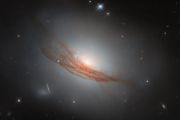
Copernical Team
Curiosity Rovers Boxwork Campaign Reaches New Heights on Mount Sharp
 Curiosity has made significant progress in its ongoing exploration of the intricate boxwork terrain along the slopes of Mount Sharp. The past several sols have brought the rover from the base of a steep ridge to a resting point within a nearby hollow, offering increasingly detailed views of these unique Martian formations. This marks a new phase in Curiosity's campaign to analyze the composition
Curiosity has made significant progress in its ongoing exploration of the intricate boxwork terrain along the slopes of Mount Sharp. The past several sols have brought the rover from the base of a steep ridge to a resting point within a nearby hollow, offering increasingly detailed views of these unique Martian formations. This marks a new phase in Curiosity's campaign to analyze the composition Mars glaciers are purer and more uniform than previously thought
 On the slopes of Martian mountains and craters clings what appears to be flowing honey, coated in dust and frozen in time. In reality, these features are incredibly slow-moving glaciers, and their contents were once thought to be mostly rock enveloped in some ice.
Work over the last 20 years has demonstrated that at least some of these glaciers are mostly pure ice with only a thin cover of
On the slopes of Martian mountains and craters clings what appears to be flowing honey, coated in dust and frozen in time. In reality, these features are incredibly slow-moving glaciers, and their contents were once thought to be mostly rock enveloped in some ice.
Work over the last 20 years has demonstrated that at least some of these glaciers are mostly pure ice with only a thin cover of NASA says it will lose about 20 percent of its workforce
This request seems a bit unusual, so we need to confirm that you're human. Please press and hold the button until it turns completely green. Thank you for your cooperation!
Press and hold the button
If you believe this is an error, please contact our support team.
185.132.36.159 : 2fec995a-d4e5-478a-8158-b3a91699
European Vega C rocket ferries satellites into orbit
This request seems a bit unusual, so we need to confirm that you're human. Please press and hold the button until it turns completely green. Thank you for your cooperation!
Press and hold the button
If you believe this is an error, please contact our support team.
185.132.36.159 : 5add38ef-574e-4fd2-95f8-096587b4
Vega-C VV27
 Image:
Launch of Vega-C VV27
Image:
Launch of Vega-C VV27 How to watch two meteor showers peak together in late July
This request seems a bit unusual, so we need to confirm that you're human. Please press and hold the button until it turns completely green. Thank you for your cooperation!
Press and hold the button
If you believe this is an error, please contact our support team.
185.132.36.159 : dfdc2a40-1764-475d-9e0f-635256d1
Week in images: 21-25 July 2025

Week in images: 21-25 July 2025
Discover our week through the lens
The future of construction on Earth is extraterrestrial
This request seems a bit unusual, so we need to confirm that you're human. Please press and hold the button until it turns completely green. Thank you for your cooperation!
Press and hold the button
If you believe this is an error, please contact our support team.
185.132.36.159 : 958db733-fb6d-4188-92d0-952f3298
Space Force general to oversee U.S. 'Golden Dome' missile shield
 The U.S. Senate has approved Gen. Mike Guetlein to oversee President Donald Trump's national missile defense system, known as the Golden Dome.
The Pentagon announced Tuesday that Guetlein had cleared the final hurdle to leading the Office of Golden Dome for America, which will work with industry, higher education, national labs and other government agencies to develop the high-tech miss
The U.S. Senate has approved Gen. Mike Guetlein to oversee President Donald Trump's national missile defense system, known as the Golden Dome.
The Pentagon announced Tuesday that Guetlein had cleared the final hurdle to leading the Office of Golden Dome for America, which will work with industry, higher education, national labs and other government agencies to develop the high-tech miss Viasat unveils IoT Nano service for global low-power connectivity
 Viasat has introduced IoT Nano, a new satellite-powered connectivity service aimed at providing cost-effective, low-power Internet of Things (IoT) messaging in remote and hard-to-reach areas worldwide. The service, developed in partnership with ORBCOMM, enables two-way communication for monitoring and managing mobile and fixed assets across industries such as agriculture, mining, transport, and
Viasat has introduced IoT Nano, a new satellite-powered connectivity service aimed at providing cost-effective, low-power Internet of Things (IoT) messaging in remote and hard-to-reach areas worldwide. The service, developed in partnership with ORBCOMM, enables two-way communication for monitoring and managing mobile and fixed assets across industries such as agriculture, mining, transport, and 































